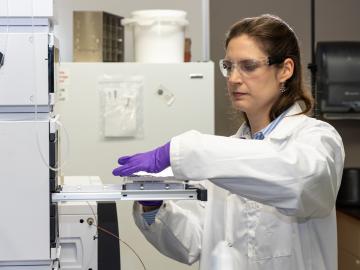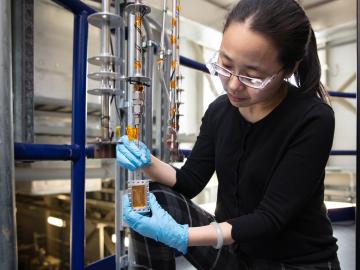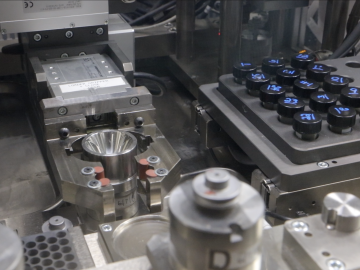
Filter News
Area of Research
- (-) Energy Science (80)
- (-) Neutron Science (28)
- Advanced Manufacturing (4)
- Biological Systems (2)
- Biology and Environment (102)
- Biology and Soft Matter (1)
- Computational Biology (1)
- Computational Engineering (2)
- Computer Science (6)
- Electricity and Smart Grid (1)
- Fuel Cycle Science and Technology (1)
- Functional Materials for Energy (1)
- Fusion and Fission (32)
- Fusion Energy (12)
- Isotope Development and Production (1)
- Isotopes (5)
- Materials (66)
- Materials for Computing (8)
- Mathematics (1)
- National Security (29)
- Nuclear Science and Technology (42)
- Nuclear Systems Modeling, Simulation and Validation (2)
- Quantum information Science (2)
- Sensors and Controls (1)
- Supercomputing (96)
News Topics
- (-) Advanced Reactors (6)
- (-) Artificial Intelligence (14)
- (-) Bioenergy (31)
- (-) Coronavirus (22)
- (-) Exascale Computing (2)
- (-) Mathematics (3)
- (-) Microscopy (10)
- (-) Molten Salt (1)
- (-) Nuclear Energy (9)
- (-) Security (8)
- 3-D Printing/Advanced Manufacturing (83)
- Big Data (7)
- Biology (18)
- Biomedical (20)
- Biotechnology (5)
- Buildings (38)
- Chemical Sciences (17)
- Clean Water (10)
- Composites (18)
- Computer Science (35)
- Critical Materials (9)
- Cybersecurity (9)
- Energy Storage (74)
- Environment (59)
- Fossil Energy (3)
- Frontier (3)
- Fusion (2)
- Grid (39)
- High-Performance Computing (8)
- Hydropower (3)
- Isotopes (1)
- Machine Learning (10)
- Materials (46)
- Materials Science (48)
- Mercury (3)
- Microelectronics (1)
- Nanotechnology (17)
- National Security (7)
- Neutron Science (121)
- Partnerships (12)
- Physics (10)
- Polymers (12)
- Quantum Computing (1)
- Quantum Science (8)
- Simulation (4)
- Space Exploration (6)
- Statistics (1)
- Summit (9)
- Transportation (68)
Media Contacts

IDEMIA Identity & Security USA has licensed an advanced optical array developed at Oak Ridge National Laboratory. The portable technology can be used to help identify individuals in challenging outdoor conditions.

Early career scientist Stephanie Galanie has applied her expertise in synthetic biology to a number of challenges in academia and private industry. She’s now bringing her skills in high-throughput bio- and analytical chemistry to accelerate research on feedstock crops as a Liane B. Russell Fellow at Oak Ridge National Laboratory.
A team of scientists led by Oak Ridge National Laboratory have discovered the specific gene that controls an important symbiotic relationship between plants and soil fungi, and successfully facilitated the symbiosis in a plant that

Scientists have discovered a way to alter heat transport in thermoelectric materials, a finding that may ultimately improve energy efficiency as the materials

Researchers at the Department of Energy’s Oak Ridge National Laboratory, Pacific Northwest National Laboratory and Washington State University teamed up to investigate the complex dynamics of low-water liquids that challenge nuclear waste processing at federal cleanup sites.
![Coexpression_hi-res_image[1].jpg Coexpression_hi-res_image[1].jpg](/sites/default/files/styles/list_page_thumbnail/public/Coexpression_hi-res_image%5B1%5D_0.jpg?itok=ww635BCP)
While studying the genes in poplar trees that control callus formation, scientists at Oak Ridge National Laboratory have uncovered genetic networks at the root of tumor formation in several human cancers.

By automating the production of neptunium oxide-aluminum pellets, Oak Ridge National Laboratory scientists have eliminated a key bottleneck when producing plutonium-238 used by NASA to fuel deep space exploration.

Oak Ridge National Laboratory scientists studying fuel cells as a potential alternative to internal combustion engines used sophisticated electron microscopy to investigate the benefits of replacing high-cost platinum with a lower cost, carbon-nitrogen-manganese-based catalyst.

Scientists at the Department of Energy’s Oak Ridge National Laboratory have created a recipe for a renewable 3D printing feedstock that could spur a profitable new use for an intractable biorefinery byproduct: lignin.
Scientists studying a valuable, but vulnerable, species of poplar have identified the genetic mechanism responsible for the species’ inability to resist a pervasive and deadly disease. Their finding, published in the Proceedings of the National Academy of Sciences, could lead to more successful hybrid poplar varieties for increased biofuels and forestry production and protect native trees against infection.


